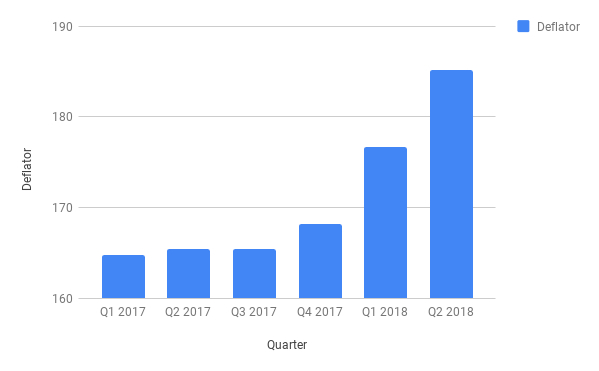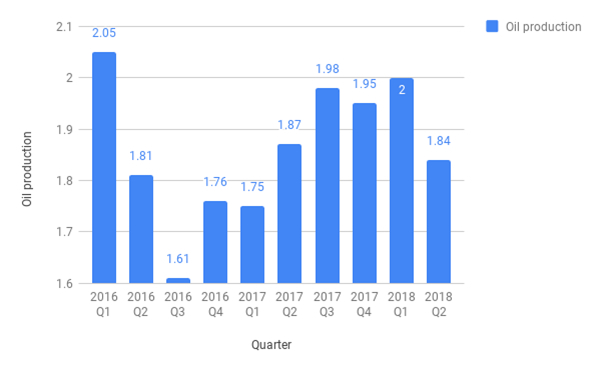Monday August 27, 2017 07:30PM / Temitope Babalola
Introduction: Continued deceleration in momentum
Gross domestic product value at market price at the end of the second quarter of 2018, stood at N30.95 trillion compared to the first quarter which was N28.708 trillion.
Similarly, gross domestic product at constant price valuation also tilted upwards from N16.24 trillion to N16.718 trillion.
Real gross domestic product at basic price grew at 1.5% at the end of the second quarter of 2018 compared to 1.95% of the previous quarter, thus reflecting 0.45% deceleration in momentum.
In a follow up, real gross domestic product at market price slipped from 2.04% in the first quarter of 2018 to 1.46% in the second quarter of 2018
The implicit price deflator, which is a measure of price movement across sectors, rose from 176.2 at the end of the first quarter of 2018 to 185.15. The upshot in deflator partly captures the drag in both consumption and investment at the end of the second quarter of 2018.
Fig 1: Deflator

Source: NBS
Apart from the manifestation of an ongoing negative output gap, the dynamics depicts continuous deceleration in output in two subsequent quarters.
Sticking to The Basics
The non-0il sector grew from 0.76% at the end of the first quarter of 2018 to 2.45% at the end of the second quarter of 2018. The oil sector experienced divergence from earlier positive territory, of 14.5% growth to eventually contract by 3.5%.
The slack in the oil sector was due to slip in oil production from 2 million barrels per day at the end of the first quarter of 2018 to 1.84 million barrels per day at the end of the second quarter. Therefore, reaching its lowest level in the last five quarters, thus contributing to the dip in output.
Fig 2: Oil Produced Per Day

Source: NBS
The new dynamic forces a rebalancing in favor of the non-oil sector whereby the non-oil sector constitute 91% of the gross domestic product and the oil sector constitutes 8.55% of gross domestic product.
Who Brought What?
Fig 3: Sectorial Distribution
| Sector | Growth |
| AGRICULTURE | 1.19 |
| MINING AND QUARRYING | -3.84 |
| MANUFACTURING | 0.68 |
| ELECTRICITY | 7.59 |
| WATER SUPPLY | 11.98 |
| CONSTRUCTION | 7.66 |
| TRADE | (2.14) |
| ACCOMMODATION | 2.43 |
| TRANSPORTATION | 21.76 |
| INFORMATION | 11.81 |
| ARTS | 3.48 |
| FINANCIAL AND INSURANCE | 1.28 |
| REAL ESTATE | (3.88) |
| PROFESSIONAL | 2.07 |
| ADMINISTRATIVE | (3.41) |
| PUBLIC ADMINISTRATION | (5.21) |
| EDUCATION | (0.67) |
| HUMAN HEALTH | 0.41 |
| OTHER SERVICES | 2.72 |
Source: NBS
The agricultural sector expanded at a relatively subdued pace of 1.19% compared to 3% in the previous quarter of 2018. The Mining and Quarrying sector contracted by 3.84% largely due to the slip in oil production. The manufacturing sector grew at 0.68% compared to 3.39% reflecting a deceleration of 2.71%.
The deceleration was largely due to the slip in both food and beverage sub sector coupled with electrical and electronic subsector. The utility sector remained positive, namely electricity and water supply grew by 7.59% and 11. 98% at the end of second quarter. The construction sector grew astronomically from 1.54 in the previous quarter to reach 7.66% at the end of the second quarter of 2018. Trade and real estate dipped at 2.14% and 3.88% respectively, thereby remaining within the bloodletting position. Accommodation and transportation grew at 2.43% and 21.76% at the end of second quarter.
The expansion in those sectors were due to seasonal effects. Information and communication grew at 11.81% at the end of the second quarter of 2017, such expansion was on the back of 11.54% growth in the telecommunication subsector. Evidently making it one of the bright spots of the second quarter of 2018.
The financial and insurance sector grew at a relatively lower pace of 1.28% at the end of the second quarter, compared to 13.3% expansion in the first quarter of 2018.
The deceleration was triggered by the slowdown in momentum in the financial sub-sector from 12.8% in the first quarter of 2018 to 0.81% in the second quarter of 2018. Two of three sectors considered to be largely to be government dominated, public administration and education contracted by 5.21% and 0.67% respectively.
The health care sector expanded by 0.41% compare to a contraction of 0.37%: apart from accelerating by 0.77%, the sector turned green for the first time after four quarters. The administrative and supportive sector grew remained within the negative territory as it contracted by 3.41%, evidently making its highest contraction so far.
Conclusion
The growth undershoot our projection of 1.82% growth for the second quarter of 2018. More worrying is that output so far have continued to underbelly both projections of the International monetary fund (IMF) and that of the federal 2% and 3.5. However, it also underlines deeper lingering negative output gaps, as the nation find itself stuck in a missing growth cycle.
Even though the macro picture remained ahead of the turning point, a large chunk of the nation capacity remained largely idle. This is as a result of rising supply shocks especially those in the agricultural sector and the vulnerability to export concentration. The present dynamic certainly threatens dents per capital income moving forward and holistically threaten the nation’s net worth.
Related News
1. Nigeria’s GDP Grew by 1.50% YoY in Real Terms in Q2 2018
2. Nigeria: Mid-Year Economic Review By Biodun Adedipe Associates
3. GDP By Income and Expenditure Approach 2017 - Household Final Consumption Fell by -0.99% in 2017
4. Nigeria’s Q4,2017 GDP:3.5% growth estimate for 2018 on course -FG
5. Some Movement in the Non-oil Economy
6. GDP Q4 17 - A Black Panther moment for Nigeria
7. Nigeria’s GDP Grows in Real Terms by 1.92% in Q4 and 0.83% for Full Year 2017
8. Q4 2017 GDP Expectation: Oil Sector to Bolster Economic Growth
9. Time surely to revisit non-oil tax rates
10. Nigeria: Non-oil economy in the driving seat
11. In Need of a Boost to Non-oil Exports
12. The Challenge of Taxing the Informal Economy
13. Nigeria’s non-oil exports increased by 55% to $1.26bn in 9M’2017
 Lagos, NG • GMT +1
Lagos, NG • GMT +1











 5389 views
5389 views






 Sponsored Ad
Sponsored Ad
 Advertise with Us
Advertise with Us









